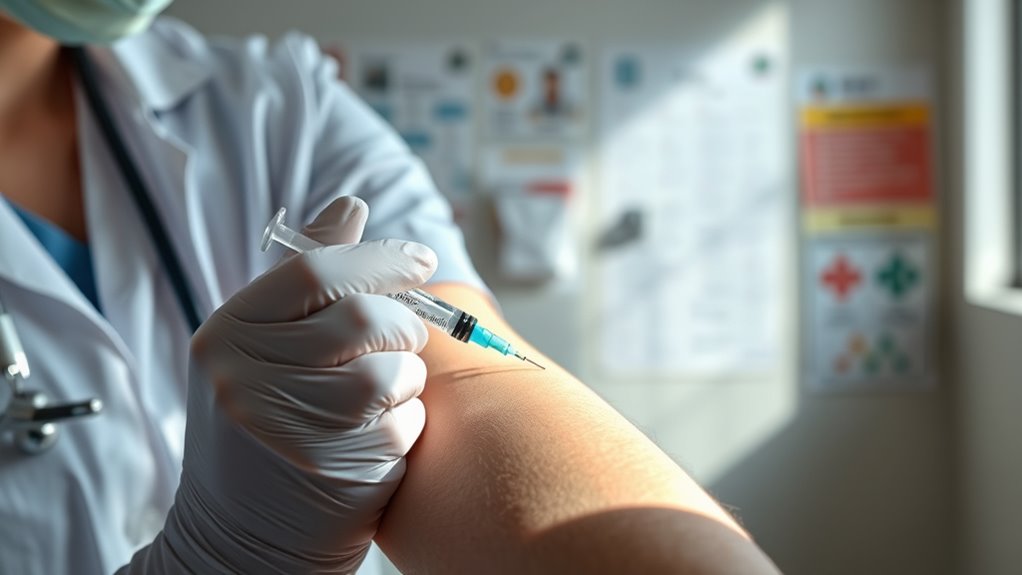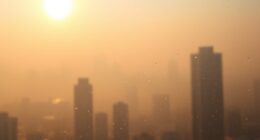To protect yourself against pneumonia, adults often get vaccinated with PCV13 and PPSV23, which target different pneumococcal strains. If you’re over 65 or have health conditions like asthma or diabetes, vaccination is particularly important. The schedule usually involves receiving PCV13 first, then PPSV23 after at least a year. While vaccines reduce severe illness, they aren’t foolproof. To understand who should get which vaccines, and when, keep exploring further.
Key Takeaways
- Adults over 65 and high-risk individuals should receive pneumococcal vaccines like PCV13 and PPSV23.
- PCV13 is given first, followed by PPSV23 after at least one year for optimal protection.
- Vaccines reduce pneumonia severity, hospitalizations, and prevent bloodstream infections and meningitis.
- Common side effects include soreness, mild fever, and fatigue; severe reactions are rare.
- Consult healthcare providers to determine vaccination timing and suitability based on individual risk factors.
Types of Pneumonia Vaccines Available for Adults

There are two main types of pneumonia vaccines recommended for adults: the pneumococcal conjugate vaccine (PCV13) and the pneumococcal polysaccharide vaccine (PPSV23). PCV13 protects against 13 strains of pneumococcus and is often given first, especially in younger adults or those with certain health conditions. It works by prompting your immune system to produce a strong, lasting response. PPSV23 covers 23 strains and is typically administered later to broaden protection, especially for older adults and high-risk groups. Both vaccines are effective at reducing the risk of pneumonia, bloodstream infections, and meningitis caused by pneumococcus. Your healthcare provider will determine which vaccine suits your health needs, but knowing these options helps you make informed decisions about your protection. Additionally, these vaccines can be integrated into comprehensive immunization strategies to enhance overall health.
Who Should Receive a Pneumonia Vaccine?

Certain groups are at higher risk of developing severe pneumonia, making vaccination especially important for them. These include older adults, people with chronic health conditions, and smokers. If you fall into one of these categories, getting vaccinated can substantially reduce your risk of serious illness. To help you identify if you’re in a high-risk group, review this table:
| Group | Why It Matters | Recommended Action |
|---|---|---|
| Adults over 65 | Weakened immune system increases risk | Get pneumococcal vaccines |
| Chronic health conditions | Conditions like asthma or diabetes raise risk | Consult your healthcare provider |
| Smokers | Smoking damages lung defenses | Consider vaccination |
Understanding immune response can further emphasize the importance of vaccination in high-risk groups. Talk to your healthcare provider to determine if you should receive a pneumonia vaccine.
Recommended Vaccination Schedules and Timing

To guarantee maximum protection against pneumonia, it’s important to follow recommended vaccination schedules and timing. Typically, adults should receive the pneumococcal conjugate vaccine (PCV13) first, followed by the pneumococcal polysaccharide vaccine (PPSV23) at least one year later. For those at increased risk, additional doses may be necessary. Additionally, advancements in vaccine technology and AI-assisted research continue to improve vaccine formulations and efficacy. Here are key points to keep in mind:
- Get PCV13 first, then PPSV23 after a year if you’re eligible.
- Adults 65+ should receive both vaccines, spaced at least a year apart.
- For high-risk groups, additional doses might be recommended.
- If you received PPSV23 before age 65, get a booster at age 65 or later.
- Always consult your healthcare provider for personalized timing recommendations.
Benefits and Effectiveness of Pneumonia Immunizations

Following the recommended vaccination schedules can considerably boost your protection against pneumonia, but understanding how well these vaccines work is equally important. Pneumonia vaccines like the pneumococcal conjugate (PCV13) and polysaccharide (PPSV23) have been proven effective in reducing both the risk and severity of pneumonia. Studies show that vaccinated individuals are less likely to develop pneumonia and are more likely to experience milder symptoms if they do. The vaccines also decrease hospitalizations and complications, especially in older adults and those with underlying health conditions. While no vaccine guarantees complete protection, immunizations substantially lower your chances of catching pneumonia and help your immune system respond more effectively if exposed. This makes getting vaccinated a smart step toward safeguarding your health. Sound healing science research indicates that combining vaccination with other holistic approaches may further enhance overall immune resilience.
Potential Side Effects and Precautions

While pneumonia vaccines are generally safe, it’s important to be aware of potential side effects and precautions. Most people experience mild reactions, but some may encounter more noticeable issues. Common side effects include soreness at the injection site, low-grade fever, fatigue, or mild headache. Rarely, allergic reactions can occur, such as difficulty breathing or swelling of the face and throat. To stay safe, inform your healthcare provider if you have allergies or a history of severe reactions. Also, let them know if you’re pregnant or immunocompromised. Always follow post-vaccination guidelines, like monitoring for adverse effects. Remember, reporting any unusual symptoms helps ensure your safety and the effectiveness of vaccination programs. Monitoring air quality can also help identify environmental factors that may influence your overall health after vaccination.
Frequently Asked Questions
How Long Does Immunity Last After Receiving a Pneumonia Vaccine?
You wonder how long immunity lasts after vaccination. Usually, the protection from pneumonia vaccines, like PCV13 and PPSV23, lasts about 5 to 10 years. However, it can vary based on your age, health, and the specific vaccine. It’s important to stay up-to-date with booster shots if recommended. Regular check-ups with your healthcare provider help guarantee you maintain peak protection against pneumonia.
Can Adults Receive Multiple Types of Pneumonia Vaccines Simultaneously?
Imagine the possibilities when you consider your health options. Can you receive multiple pneumonia vaccines at once? Generally, yes, but it depends on your specific health situation and the types of vaccines involved. Your healthcare provider will guide you on timing and compatibility, ensuring you’re protected without unnecessary risks. Don’t hesitate to ask questions—they’re key to making the best decision for your health’s future.
Are Pneumonia Vaccines Effective Against All Pneumonia-Causing Bacteria?
You wonder if pneumonia vaccines protect against all bacteria causing pneumonia. While these vaccines are effective, they target specific bacteria like Streptococcus pneumoniae or Haemophilus influenzae. They don’t cover every bacteria that can cause pneumonia, so you might still get sick from other germs. However, vaccination markedly lowers your risk of severe illness from the targeted bacteria, making it a valuable preventive step for many adults.
What Are the Costs Associated With Pneumonia Vaccination for Adults?
Think of the cost of pneumonia vaccines as planting seeds for your health garden. While prices vary, you might pay around $40-$80 for the shot, sometimes covered by insurance. Skipping the vaccine could lead to hefty medical bills if pneumonia strikes. Investing in vaccination is like building a sturdy fence around your health, saving you money and pain in the long run. Protect yourself now; it’s a small price for peace of mind.
Should Adults With Certain Health Conditions or Allergies Avoid Vaccination?
You should talk to your healthcare provider if you have certain health conditions or allergies before getting vaccinated. While most adults benefit from pneumonia vaccines, some conditions like severe allergies to vaccine components or a weakened immune system might require special precautions. Your provider can assess your medical history, ensuring the vaccine is safe for you and decide if any alternative options are better suited to protect your health.
Conclusion
Getting vaccinated against pneumonia is a smart step to protect your health, especially since adults over 65 are five times more likely to be hospitalized from the illness. With several effective vaccine options and clear recommendations, you can markedly reduce your risk. Remember, vaccination not only safeguards you but also helps prevent the spread to others. Stay informed, follow the schedule, and give yourself the best chance at staying healthy.









